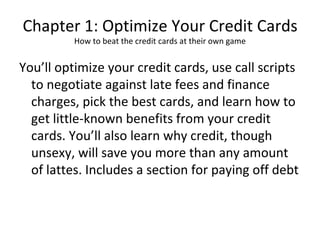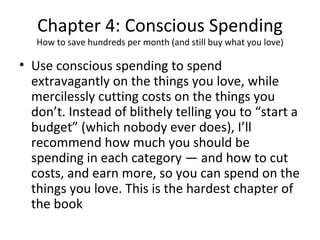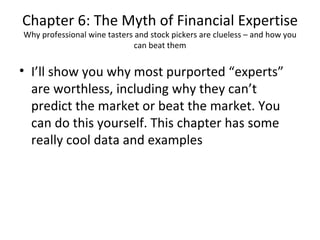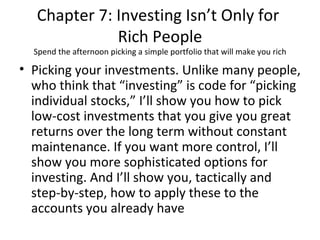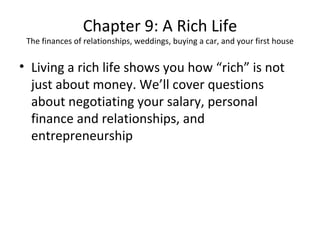Table Of Contents Ppt For Iwillteachyoutoberich Book
- 2. Chapter 1: Optimize Your Credit Cards How to beat the credit cards at their own game You’ll optimize your credit cards, use call scripts to negotiate against late fees and finance charges, pick the best cards, and learn how to get little-known benefits from your credit cards. You’ll also learn why credit, though unsexy, will save you more than any amount of lattes. Includes a section for paying off debt
- 3. Chapter 2: Beat the Banks Open high-interest, low-hassle accounts and negotiate fees like an Indian You’ll pick the best bank accounts (closing worthless, fee-ridden accounts in exchange for high-interest accounts), including savings and checking accounts. I’ll recommend my favorite accounts, give you phone numbers and URLs, and show you how to beat your bank if they try any tricks to get your money
- 4. Chapter 3: Get Ready to Invest Open your 401(k) and Roth IRA – even with just $50 Open the right investment accounts and fund them with a little bit of money. No need to pick your investments yet — we’re just opening investment accounts and making sure you’re taking advantage of all the tax benefits in different accounts. Includes different options for your situation, and my favorite accounts
- 5. Chapter 4: Conscious Spending How to save hundreds per month (and still buy what you love) Use conscious spending to spend extravagantly on the things you love, while mercilessly cutting costs on the things you don’t. Instead of blithely telling you to “start a budget” (which nobody ever does), I’ll recommend how much you should be spending in each category — and how to cut costs, and earn more, so you can spend on the things you love. This is the hardest chapter of the book
- 6. Chapter 5: Save While Sleeping Making your accounts work together -- automatically Automate your accounts in a personal-finance system that will take you about 1 hour/week to maintain. I’ll show you “The Next $100 Principle,” which demonstrates (with a graphic!) how your next $100 will get automatically allocated to your system. The goal is to simplify your financial decisions so all you have to do is focus on funneling as much cash in the front-end of your system. The back-end will handle itself
- 7. Chapter 6: The Myth of Financial Expertise Why professional wine tasters and stock pickers are clueless – and how you can beat them I’ll show you why most purported “experts” are worthless, including why they can’t predict the market or beat the market. You can do this yourself. This chapter has some really cool data and examples
- 8. Chapter 7: Investing Isn’t Only for Rich People Spend the afternoon picking a simple portfolio that will make you rich Picking your investments. Unlike many people, who think that “investing” is code for “picking individual stocks,” I’ll show you how to pick low-cost investments that you give you great returns over the long term without constant maintenance. If you want more control, I’ll show you more sophisticated options for investing. And I’ll show you, tactically and step-by-step, how to apply these to the accounts you already have
- 9. Chapter 8: Easy Maintenance You’ve done the hard work: Here’s how to maintain (and optimize) your financial infrastructure Once your system is set up and running, this chapter shows you how to maintain it. How often should you be checking in? What should you do on a weekly basis? Are there tweaks to get you to your goal faster?
- 10. Chapter 9: A Rich Life The finances of relationships, weddings, buying a car, and your first house Living a rich life shows you how “rich” is not just about money. We’ll cover questions about negotiating your salary, personal finance and relationships, and entrepreneurship

